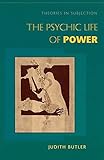Psychic life of power theories in subjection
Material type: TextPublication details: Stanford Stanford University Press 1997Description: 218 p. 22 cmISBN:
TextPublication details: Stanford Stanford University Press 1997Description: 218 p. 22 cmISBN: - 9780804728126
- 126 22 BU-P
 Print
Print
| Item type | Home library | Collection | Shelving location | Call number | Materials specified | Status | Notes | Date due | Barcode | |
|---|---|---|---|---|---|---|---|---|---|---|
 Print
Print
|
OPJGU Sonepat- Campus | General Books | Main Library | 126 BU-P (Browse shelf(Opens below)) | Available | Giffted Prof Andrew Hay | 016188 | |||
 Print
Print
|
OPJGU Sonepat- Campus | General Books | Main Library | 126 BU-P (Browse shelf(Opens below)) | Available | 122017 |
Includes bibliographical references and index.
1. Stubborn Attachment, Bodily Subjection: Rereading Hegel on the Unhappy Consciousness -- 2. Circuits of Bad Conscience: Nietzsche and Freud -- 3. Subjection, Resistance, Resignification: Between Freud and Foucault -- 4. "Conscience Doth Make Subjects of Us All": Althusser's Subjection -- 5. Melancholy Gender/Refused Identification: Keeping It Moving -- Commentary on Judith Butler / Adam Phillips -- Reply to Adam Phillips -- 6. Psychic Inceptions: Melancholy, Ambivalence, Rage.
As a form of power, subjection is paradoxical. To be dominated by a power external to oneself is a familiar and agonizing form power takes. To find, however, that what "one" is, one's very formation as a subject, is dependent upon that very power is quite another. If, following Foucault, we understand power as forming the subject as well, it provides the very condition of its existence and the trajectory of its desire.
Power is not simply what we depend on for our existence but that which forms reflexivity as well. Drawing upon Hegel, Nietzsche, Freud, Foucault, and Althusser, this challenging and lucid work offers a theory of subject formation that illuminates as ambivalent the psychic effects of social power.
Although most readers of Foucault eschew psychoanalytic theory, and most thinkers of the psyche eschew Foucault, the author seeks to theorize this ambivalent relation between the social and the psychic as one of the most dynamic and difficult effects of power.
This work combines social theory, philosophy, and psychoanalysis in novel ways, offering a more sustained analysis of the theory of subject formation implicit in such other works of the author as Bodies That Matter: On the Discursive Limits of "Sex" and Gender Trouble: Feminism and the Subversion of Identity.
There are no comments on this title.

